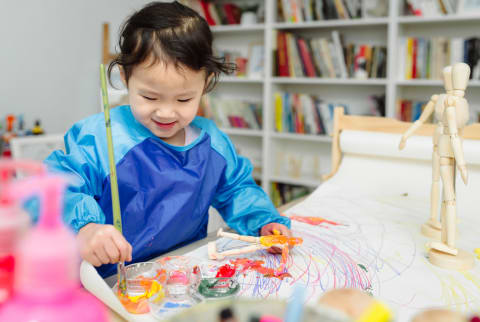Advertisement
These Are The Toys Your Child Should Be Playing With, According To A Psychologist


While toys are first and foremost a way for kids to have fun, different toys do nurture different aspects of a child's spirit, mind, and behavior, especially between the ages of 3 and 7. "This is the preoperational stage of cognitive development, so play and pretend are hallmarks of this stage," explains child psychologist Bobbi Wegner. "Cognitively, it is still difficult for kids to use and apply logic."
For that reason, the toys kids play with are especially key during this time. Here's what types of toys and methods of play Wegner recommends kids engage with, depending on what qualities parents are looking to foster.
To encourage learning...
At this stage, kids are just beginning to learn how to problem-solve. So introducing toys like puzzles, LEGOs, and even giving them tasks to do around the house like helping to put away dishes can help encourage learning. "Where's Waldo books are also great for younger kids," says Wegner. "Try introducing mazes, tic-tac-toe, and board games like Chutes and Ladders, Lincoln Logs, plain old building bricks, and Magna-Tiles when you want to help them develop an interest in learning."
To foster creativity...
When it comes to encouraging creativity, the possibilities are endless. But Wegner says the key here is providing open, unstructured time. "It’s important for cognition, independence, and creativity to provide lots of art time where kids can create whatever they want," she explains. "Provide different-size crayons and markers, clay, nontoxic paint, kid scissors, and lots of colored paper, kid glue, Play-Doh… really any kind of kid-safe art material. Music also stokes kids with creativity. Play all sorts of music! Wooden spoons, pots and pans, and little harmonicas."
To encourage kindness...
In an era when kindness is more important than ever, Wegner notes that it's important to start kids young. Wegner suggests encouraging kids to create art and letters when people are sick, or for their birthdays, or to show your appreciation "just because." "Building kindness is all about doing for others," she says. "Baking is another kid-friendly way of creating for others. Egocentrism is also a hallmark of this stage, so it's not natural for them to think about others. Therefore, the responsibility falls on the parents to help encourage kind, prosocial behavior. Hosting a bake sale is great, especially if the kids can give all or half of the profits to charity."
To teach your kids how to self-soothe...
Self-soothing is an important skill that kids learn early on. And once they cultivate positive self-soothing skills, they can last a lifetime. "Help kids identify what is comfortable for them—a really furry blanket could be super cozy for one kid and trigger another such as kids with sensory processing issues—and then provide options," she suggests. "Cozy spots in the house, cozy blankets and clothes. And help kids name what is comfortable for them. For some, it will be curling up on a couch with Mom; for others it is spinning in the corner or listening to loud music. This category is much more individual. You can also teach yoga, mindfulness, and breathwork at this age."
She adds that kids often need help identifying why they're feeling certain feelings at all. "Kids need help in first understanding the emotion and what they need and then need help in identifying what brings comfort," she explains. "Many kids like things that are soft and snug—like blankie tales, things to chew like chew necklaces, and things to fidget with like fidget spinners and blocks or squishies. Bath bombs are also a favorite in my house. All of my kids love using them in a relaxing bath!"
Want to know why your kids are so obsessed with selfies? Here's your answer.











